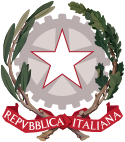
Back علاقات إيطاليا الخارجية Arabic İtaliyanın xarici siyasəti Azerbaijani Zahraniční vztahy Itálie Czech Διεθνείς σχέσεις της Ιταλίας Greek Relaciones Exteriores de Italia Spanish Politique étrangère de l'Italie French יחסי החוץ של איטליה HE Relazioni internazionali dell'Italia Italian 이탈리아의 대외 관계 Korean Italijos tarptautiniai santykiai Lithuanian
| Part of the Politics series |
 |
|---|
|
|
The foreign relations of the Italian Republic are the Italian government's external relations with the outside world. Located in Europe, Italy has been considered a major Western power since its unification in 1860.[1] Its main allies are the NATO countries and the EU states, two entities of which Italy is a founding member. Italy was admitted to the United Nations in 1955, and it is a member and a strong supporter of a wide number of international organisations, such as the Organisation for Economic Co-operation and Development (OECD), the General Agreement on Tariffs and Trade and World Trade Organization (GATT and WTO), the Organization for Security and Co-operation in Europe (OSCE), the Council of Europe, and the Central European Initiative.
Its turns in the rotating presidency of international organisations include the Organization for Security and Co-operation in Europe, the G7 and the EU Council. Italy is also a recurrent non-permanent member of the UN Security Council. Italy is an important actor in the Mediterranean region and has close relations with the Romance-speaking countries in Europe and Latin America. Although it is a secular state,[2] Rome hosts the Pope and the headquarters of the Catholic Church, which operates a large diplomatic system of its own. Italy is currently commanding various multinational forces and has significant troops deployed all over the world for peacekeeping missions, and for combating organized crime, illegal drug trade, human trafficking, piracy and terrorism.[3]
- ^ française, La Documentation. "L'Italie : un destin européen". www.ladocumentationfrancaise.fr. Archived from the original on 2013-05-09. Retrieved 2014-10-25.
- ^ Articles 3, 7, 8, 19, 20 of the Constitution of Italy; Constitutional Court's Decision n. 203/1989
- ^ (in Italian) Documento programmatico pluriennale per la Difesa per il triennio 2014-2016 Archived 2016-03-04 at the Wayback Machine. Italian Ministry of Defence, August 2014.